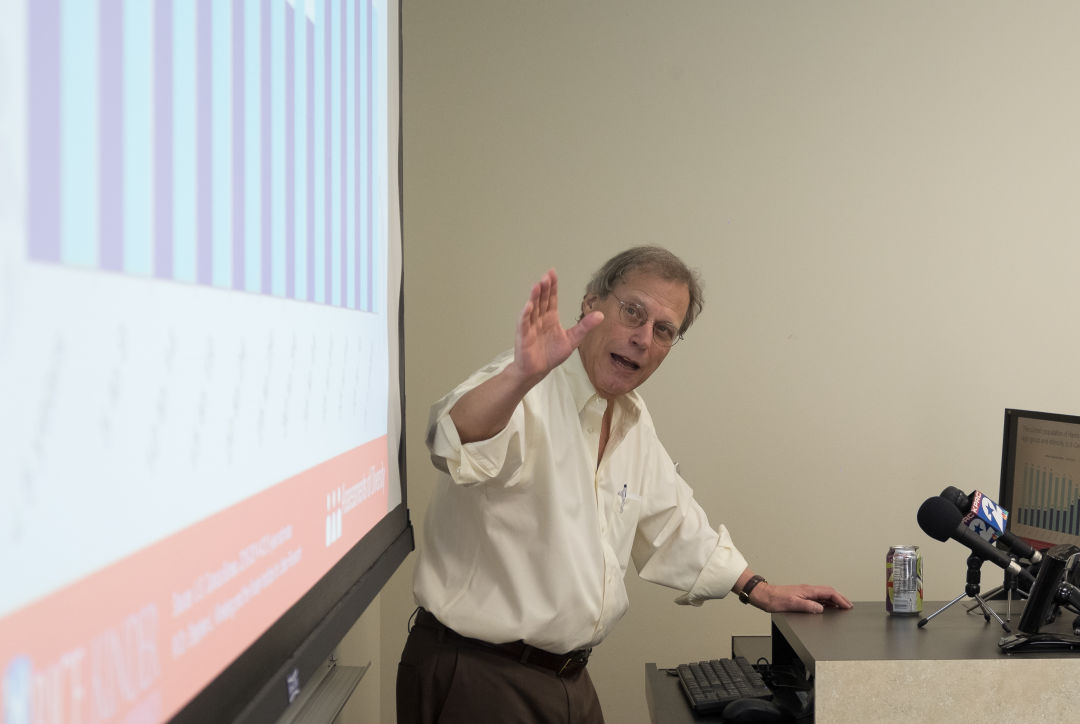Top 5 Takeaways from the Latest Houston Area Survey

Stephen Klineberg, founding director of the Kinder Institute for Urban Research at Rice University, presents the 35th annual Houston Area Survey. Photo Credit: Jeff Fitlow, Rice University
The 35th annual Houston Area Survey, conducted by The Kinder Institute for Urban Research at Rice University, came out today, and paints a picture of an increasingly diverse, left-leaning and optimistic population.
The survey asked 803 residents of Harris County, and 401 residents each of Fort Bend and Montgomery counties, about things like their economic outlook, their views on diversity and their quality of life. Founding director Stephen Klineberg was on hand today at Rice to explain some of the findings. Here are some key takeaways:
Houstonians remain optimistic about the city's economy and their personal futures.
Despite oil prices dropping in late 2014 and staying low ever since, Klineberg says that those surveyed displayed that "classic Houston optimism": 61 percent of those surveyed said they are confident they'll be better off financially in three or four years, compared to 54 percent in 2015. And with all the talk of energy layoffs making local and national headlines, the percent of residents surveyed who rated job opportunities as excellent or good only dropped to 62 percent, from 69 percent last year. "There's still a very upbeat feeling about Houston," Klineberg says. "It's a reminder that most Houstonians aren't yet affected." Still, he says, he's on the lookout for how that trend plays out — we may not have seen the worst of the economic effects.
Houstonians' views on HERO don't match up with the way the city voted.
One of the most surprising responses of this year's survey was to a first-time question. Just a few months after Houston defeated its anti-discrimination ordinance by a vote of 61 percent to 39 percent, surveyed residents were asked how important they thought it was for the city "to pass a local equal rights ordinance that would protect people from discrimination." A full 60 percent of respondents said it was "very important"; an additional 19 percent said it was "somewhat important." Klineberg attributes the huge disparity to the way the question was framed. "A vote on HERO was not a vote on discrimination," Klineberg said, referring to the widespread "bathroom" ads positioning of the ordinance narrowly as allowing men in women's restrooms. Klineberg points to a wide swath of data collected on Houstonians' embrace of the city's diversity—the survey shows wide support for lenient immigration policies, and 64 percent said refugees who were in danger in their home countries should always be welcome in Houston.
The city's main problem? Still traffic.
Twenty-nine percent of those surveyed said, without prompting, that traffic is the biggest problem facing Houston, compared with 21 percent each who said the city's biggest problem was the economy or crime. Past data points to traffic being a main concern when the city has experienced rapid growth, like the early 1980s. The same is true today—Houston added more people last year than any other metro area, and we've got the bumper-to-bumper rush hours to prove it. In response, half of Harris County residents prefer smaller homes with walking-distance access to shops and workplaces, and 62 percent of Harris County respondents think developing and improving our mass transit system is "very important."
More Houstonians are getting out to play.
The city has made leaps and bounds with increasing access to parks and trails, from the Buffalo Bayou Park's massive renovation to the Bayou Greenways 2020 Project, which will create a continuous parks system across all Houston's major waterways. The number of Harris County residents with access to a park within a mile is 88 percent; in Fort Bend County, it's 92 percent. And survey data shows that Houstonians are happily making use of all this new green space—57 percent of Harris County respondents said they'd visited a park at least once a month in the past year, up from 44 percent in 2012. Same goes with trails: 50 percent of Harris County respondents, up from 30 percent in 2012, said they've used a hike or bike trail at least once a month.
Most residents are happy to call Houston home.
Despite residents' concerns about things like traffic, air quality, and crime, Houstonians have consistently given high ratings to the city as a good place to live—this year, 81 percent of respondents gave the city an "excellent" or "good" rating, and 38 percent said living conditions have improved over the last three or four years. "Houston, without anyone having planned it, has become the forefront of ethnic diversity in this country," Klineberg says. "And Houstonians welcome the tremendous richness this diversity brings."




